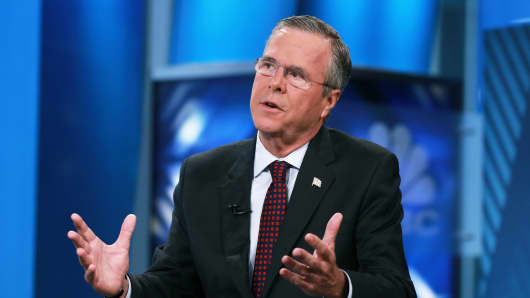In June, Bush released 33 years of tax returns—more than any other major presidential candidate in history. The returns show his business growth as a real estate player in Florida, the drop in income when he took office as governor, and sky-rocketing income as a consultant and speaker in the years since leaving office.
"On the top end you have businesses that allow you to take a lot of expense deductions that the lower end doesn't have," said Timothy Gagnon, faculty director for the MST and MSA online programs at Northeastern University. "If I'm an average guy and I buy the Boston Globe, I just pay for it, but if I need the Boston Globe to keep up with business affairs, I get to deduct it."
Bush outlined his tax plan in a speech at a poultry-cooling-equipment facility in North Carolina on Wednesday and in an op-ed in the Wall Street Journal. He later went on a media blitz extolling the virtues of his proposal, including an appearance on CNBC's "Squawk Box."
As expected, parts of the plan play a familiar Republican tune: Reducing the number of tax brackets from seven to three would simplify the tax code for millions of Americans and a lower overall corporate tax rate could help spur economic growth. But there's also some unfamiliar populist notes in there, like taxing carried interest as regular income and eliminating federal income taxes for families making less than $38,600.
"The highest earners will actually pay a greater share of the taxes than they did before," a Bush spokesman wrote in an email.
Bush himself would see his after-tax adjusted gross income rise 10.9 percent, based on 2013 taxes.
Bush's plan would also reduce taxes on investments to a flat 20 percent, which he says is necessary to encourage necessary economic growth. That would have saved him about $45,000 on his taxes between 2008 and 2013, according to our analysis.











